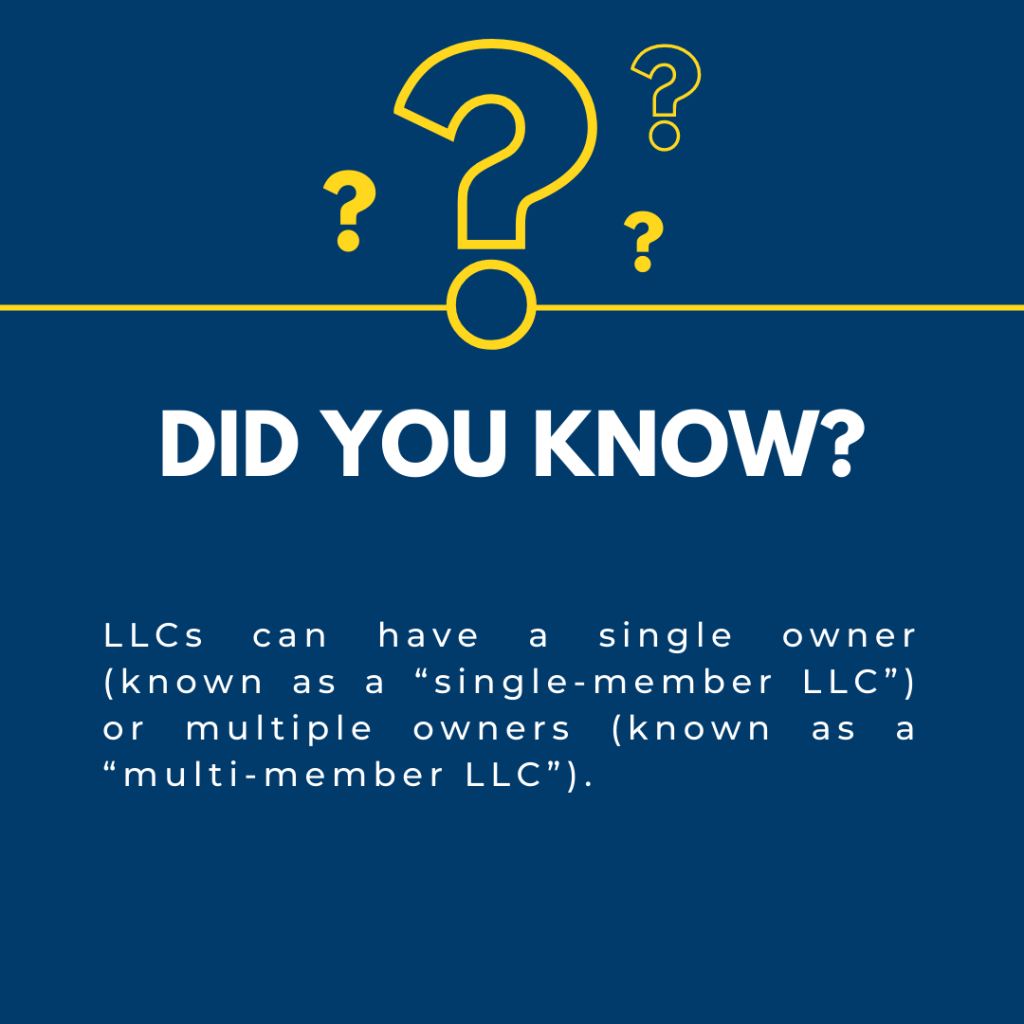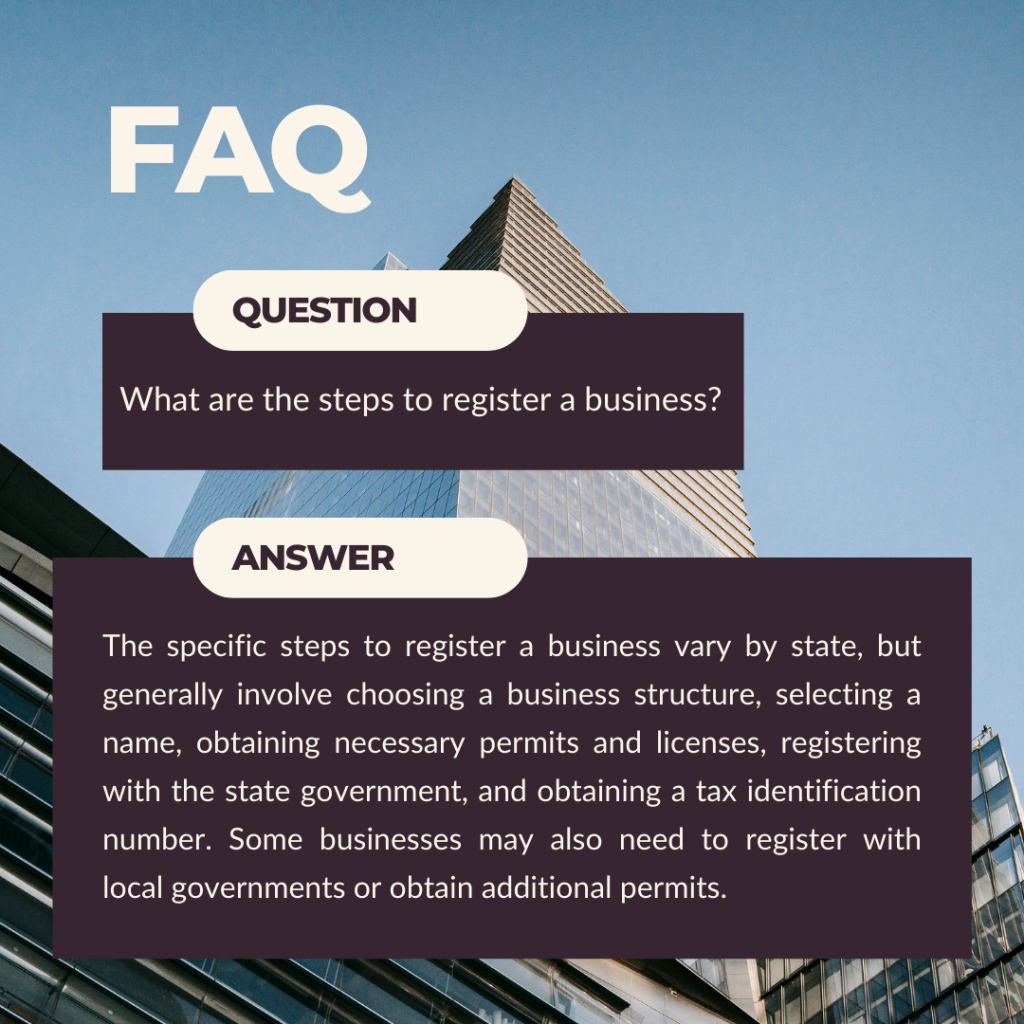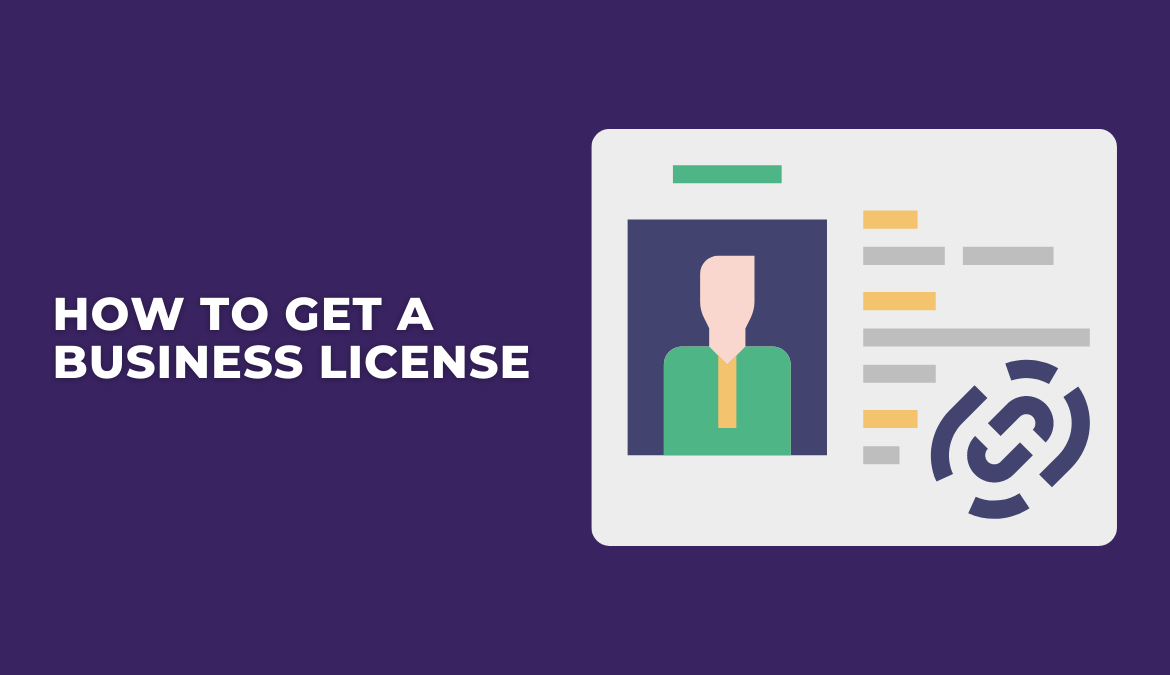Starting a business can be an exciting prospect, but it can also be overwhelming, especially when meeting legal requirements.
Obtaining a business license is crucial in launching your business, as it authorizes you to operate legally within a specific jurisdiction. Failure to obtain a business license can result in penalties and legal issues.
This guide will take you through obtaining a business license, including determining whether you need one, completing the application, and paying the required fees. Whether starting a new business or expanding an existing one, this article will help you obtain a business license and ensure you comply with all legal requirements.
How to Get a Business License in 5 Easy Steps?
The process of acquiring a business license isn’t the same in all states, and it may not be obligatory for all types of businesses. To determine if a license is required and to submit an application for one in your state, adhere to the instructions outlined below.
Step 1: Find Out What Business Licenses You Need
Firstly, it’s crucial to identify the licenses that are appropriate for your business. To do so, you should take into account the following aspects:
- Business Structure: When starting a business, it’s crucial to select the appropriate structure since it’ll determine the registration requirements. There are various business structures available, such as sole proprietorship, partnership, corporation, and Limited Liability Company (LLC).
- Business Location: The regulations that you need to comply with for your business are largely determined by where you choose to establish it. This means that depending on the state, county, and city, you will need to adhere to different sets of local, state, and federal regulations.
- Industry Type: To sell specific products or offer professional services, it may be necessary for you to acquire particular licenses and permits that are relevant to your industry. These certifications serve as evidence that you and your team possess the necessary qualifications to perform the required tasks.
It’s crucial to conduct comprehensive research to obtain all the essential licenses and permits for your business. Government agency websites can be a valuable source for gathering information and downloading relevant forms.
If you need any assistance during the application process, you can directly contact the agency by phone, email, or a contact form. Moreover, these websites can also offer useful advice to kick-start your business.
Step 2: Gather License Requirements
It’s crucial to gather all the necessary documents and meet all the required criteria before applying for a business license. The specific documentation required may vary depending on the type of license you’re seeking, but there are some general requirements that are applicable to most licenses.
- Business description, plans, and location overview
- Sales tax permit and other tax documents
- Ownership and management documents
- Filing fees
- Corporate records
If your business belongs to specific industries, you might have to provide extra requirements.
- Surety bonds
- Insurance records
- Proof of professional qualifications or training credentials for you and key members of your team
- Financial statements
Step 3: Submit Your License Application
To get the necessary licenses and permits, it’s necessary to contact the respective government agencies.
You must fill out and submit an application form for each business license you want to pursue. It’s essential to carefully go through the guidelines provided as each form has distinct prerequisites.
Although most forms can be submitted online, some need to be sent by mail or fax. Furthermore, some forms may require the notarization of signatures from several parties.
Step 4: Wait for Approval
Please wait for your license application to be processed, as the waiting period varies depending on the agency.
Some agencies may approve your license quickly, while others may take several weeks or even months to review and grant approval. If you haven’t received any updates after a reasonable period of time, contact the agency to inquire about your approval status.
Moreover, if the agency contacts you about your incomplete application, provide the missing requirements promptly to avoid any delays in the approval process.
Step 5: Maintain Your Business Licenses
It’s very important to ensure that you keep your business licenses and permits up-to-date once you have acquired them in order to ensure the smooth operation of your business.
Licenses usually have a defined period of validity, so it’s important to renew them before they expire. Meeting all the requirements for renewal is vital to maintaining your business’s authorization to operate.
What Is a Business License?
A business license includes all the licenses and permits required to run a business and provide services in a specific area. These licenses are issued by government agencies at different levels – federal, state, county, and municipal.
The purpose of obtaining a business license varies from registering your business with the government for tax purposes to meeting industry standards and regulations.


Do You Need a Business License?
Various factors, such as location and the type of services or goods offered, play a crucial role in determining the legal requirement for obtaining a business license. Though a general business license isn’t mandatory in most states, the requirement for obtaining one from the city or county may vary.
Additionally, the nature of the business activities, such as agriculture or medicine, may require a license from a state or federal regulatory agency.
For online businesses, it’s essential to register and obtain the necessary licenses from the state and city where the business is based. In case you’re a digital nomad, it’s advisable to seek guidance from your lawyer and accountant to set up your business in the best possible way.
What Are the Types of Business Licenses?
There are a range of licenses and permits that businesses can apply for, and the specific one required will depend on the type of business. To discover the various license options and their suitability for your business, refer to the following details.
These details will also provide information on where and how to apply for each license, along with the typical application fees.
1. General Business License
If you plan to start a business in a particular area, you’ll need to obtain a general business license, which is a document issued by the government. It’s usually in the form of a tax registration certificate and is mandatory to operate a business in that jurisdiction.
To obtain this business license, you will need to apply to the relevant city, county, or state agency responsible for business registrations. You’ll need to submit the license application form, fees, and other necessary documents to acquire the license.
Recommended For: Most business owners in the U.S.
Estimated Fee: The price may fluctuate and could be approximately $50 or higher, depending on the geographical area, such as state, county, or city.
2. DBA License
If you wish to register your business under a different name than your legal business name, you can obtain a “doing business as” (DBA) license. By default, your business name is your personal name if you establish a sole proprietorship or partnership.
However, you can choose a fictitious or trade name to rebrand your business. To register your DBA name, you can do so with either the county clerk’s office or the state government.
Some states require DBA name filings to be made public to protect consumer interests. It’s important to note that if you’re operating under your own name or if you own an LLC or corporation with a registered business name, there’s no need to file a DBA.
Recommended For: Aspiring entrepreneurs who wish to operate their own business as a sole proprietorship or a partnership under a distinct name are allowed to do so.
Estimated Fee: The price range can differ from around $5 to $100, depending on the particular county or state.


3. Seller’s Permit
A seller’s permit is a license businesses must have to gather sales tax on their taxable merchandise and services. After obtaining the permit, it’s the business owner’s responsibility to submit the collected taxes to the state.
If you’re looking to get a seller’s permit, you need to submit an application to your state’s Department of Revenue. It’s important to remember that Alaska, Montana, Delaware, Oregon, and New Hampshire don’t have sales tax.
Recommended For: Entrepreneurs who sell products and services that are taxable when purchased by customers are being referred to here.
Estimated Fee: The service is free of charge in most states, but there may be a fee ranging from $12 to $100 in some states.
4. Federal Business License
If you’re planning on running a business that involves activities regulated by a federal agency, you’ll need to get a federal business license. It’s particularly important to obtain one if your business is related to agriculture, broadcasting, investment consultancy, alcohol, or meat product preparation.
The U.S. Department of Agriculture (USDA), Federal Communications Commission (FCC), Securities and Exchange Commission (SEC), Alcohol and Tobacco Tax and Trade Bureau (TTB), and the U.S. Food and Drug Administration (FDA) are some of the government agencies that can issue federal business licenses.
However, each agency has its own specific requirements. So, it’s best to contact the relevant agency to determine the prerequisites for your business.
Recommended For: There are several industries that business owners can be a part of, including meat product preparation, alcohol, investment, agriculture, and broadcasting.
Estimated Fee: The issuing agency and the industry of business are the factors that determine it.
5. Zoning Permit
To run a business in a particular area, it’s essential to obtain a zoning permit that aligns with the nature of your venture and the industry it belongs to. Every municipality has its own rules and regulations that determine the types of businesses that can operate in specific zones.
To obtain a zoning permit, you must reach out to your county or city zoning department and comply with the zoning guidelines in your locality.
Recommended For: Individuals who are in charge of overseeing a brick-and-mortar establishment, storage facility, or production facility.
Estimated Fee: The price of commercial real estate can fluctuate greatly depending on the state and size of the property. The cost can range anywhere from around $50 to $1,500.
6. Building Permit
Whenever you have plans to construct a new building or modify an existing one, it’s imperative to obtain a building permit. The building department of your city or town is responsible for providing you or your contractor with the necessary permit.
You will be required to submit your site, structural, and architectural plans, along with details of safety measures, accessibility, electrical and plumbing systems, and occupancy in order to obtain the permit.
Recommended For: People who own a business and plan to start a new construction project or make significant changes to their current structures.
Estimated Fee: The price of a construction project can vary greatly depending on its size, complexity, and location. Thus, the cost can fall anywhere between roughly $400 to more than $2,200.
7. Occupational License
To offer your professional services through your business in a lawful manner, it’s mandatory to acquire an occupational license.
This requires proving to the concerned board or certifying body in your industry that you possess the required expertise and knowledge, which you obtained through suitable training and education.
The process of obtaining an occupational license may involve passing a written or practical exam, or finishing training modules or educational courses, depending on the type of license you intend to get.
Recommended For: People who are employed in particular industries like healthcare, law, accounting, real estate, electrical services, plumbing, and cosmetology are professionals who have specialized knowledge and skills. They either own their business or work in a team to provide their services.
Estimated Fee: People who are employed in particular industries like healthcare, law, accounting, real estate, electrical services, plumbing, and cosmetology are professionals who have specialized knowledge and skills. They either own their business or work in a team to provide their services.
8. Health Permit
To run your business, obtaining a health permit is a must. This permit ensures that you have complied with the safety standards set by the health department.
If your business involves food preparation and distribution or involves direct body contact with customers, then you need to apply for a health permit from your county health department.
The permit application process involves facility inspections and certification courses that are tailored to your business type.
Recommended For: People who are in charge of running businesses in the food field, like restaurants and food delivery services, and those operating in the beauty industry, like beauty parlors, nail spas, and massage centers.
Estimated Fee: The expenses of a business can vary greatly based on various factors such as the industry, size, and geographical location. The expenses may range from $100 to $3,000 or even more.
9. Special State License
In order to sell certain products like alcohol, gasoline, firearms, and lottery tickets, it’s required by law to have a license issued by the state.
To obtain this license, you must meet the state’s specific standards for the sale of these products, and the application process is extremely important. Different state agencies, such as the Alcoholic Beverage Control (ABC) and state gambling agencies, issue various licenses with varying requirements.
Recommended For: Business owners offer goods like alcohol, lottery tickets, firearms, and gasoline for sale to their customers.
Estimated Fee: The necessary criteria may differ based on the specific field and the governing body responsible for authorizing them.
How to Get a Business License? – Frequently Asked Questions
As an entrepreneur planning to start or register a business, it’s crucial to understand the procedure of acquiring a business license. This will streamline the process of launching your business. To simplify things, you can refer to frequently asked questions about business licenses and permits.
How to Get a Business License: Which Factors Should I Consider When Choosing a Business License?
When you’re seeking licenses and permits for your business, it’s crucial to keep a few things in mind. To start with, the type of structure you select will have an effect on the necessary permits and licenses.
Additionally, where your business is located will factor into the process. Finally, the sector in which your business operates will have its own unique licensing and permitting prerequisites.
How to Get a Business License: Can You Run a Business Without Registering It?
As a business owner, you can decide to run your venture as a sole proprietorship or a general partnership without establishing a formal business entity such as an LLC or corporation.
However, it’s crucial to remember that sole proprietorships and partnerships may still need to register DBAs and obtain business licenses from relevant government authorities.
How to Get a Business License: How Much Does a Business License Cost?
The fees for obtaining a business license may vary depending on the state and industry you’re in. The cost can range from $50 to $200 based on the location of your business and the type of license required.
However, some businesses may not require a license to operate, which means you could potentially avoid any fees.
Bottom Line on How to Get a Business License?
When launching a business, it’s essential to apply for the necessary licenses to make it legitimate. This step ensures that your business is legal and authorized to operate.
To help you determine the licenses and permits required as an entrepreneur, we have created a practical guide you can refer to in the future. Don’t forget to bookmark this page to review the steps for obtaining your business license easily.

